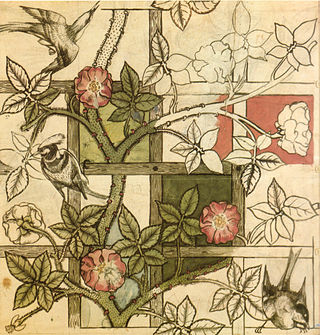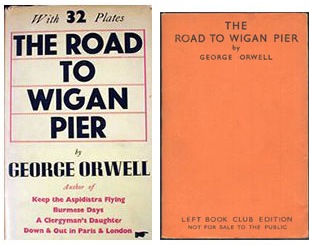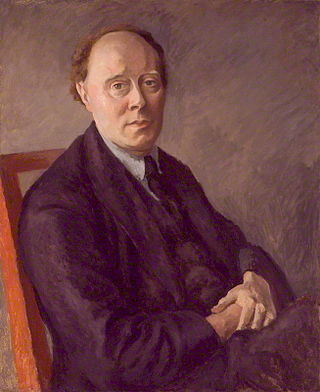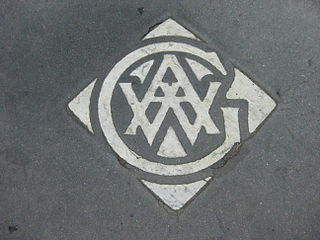
Eric Arthur Blair, better known by his pen name George Orwell, was an English novelist, essayist, journalist, and critic. His work is characterised by lucid prose, social criticism, opposition to totalitarianism, and support of democratic socialism.
The Bloomsbury Group—or Bloomsbury Set—was a group of associated English writers, intellectuals, philosophers and artists in the first half of the 20th century, including Virginia Woolf, John Maynard Keynes, E. M. Forster and Lytton Strachey. This loose collective of friends and relatives was closely associated with the University of Cambridge for the men and King's College London for the women, and they lived, worked or studied together near Bloomsbury, London. According to Ian Ousby, "although its members denied being a group in any formal sense, they were united by an abiding belief in the importance of the arts." Their works and outlook deeply influenced literature, aesthetics, criticism, and economics as well as modern attitudes towards feminism, pacifism, and sexuality.

The Arts and Crafts movement was an international trend in the decorative and fine arts that developed earliest and most fully in the British Isles and subsequently spread across the British Empire and to the rest of Europe and America.

Coming Up for Air is the seventh book by English writer George Orwell, published in June 1939 by Victor Gollancz. It was written between 1938 and 1939 while Orwell spent time recuperating from illness in French Morocco, mainly in Marrakesh. He delivered the completed manuscript to Victor Gollancz upon his return to London in March 1939.

The Road to Wigan Pier is a book by the English writer George Orwell, first published in 1937. The first half of this work documents his sociological investigations of the bleak living conditions among the working class in Lancashire and Yorkshire in the industrial north of England before World War II. The second half is a long essay on his middle-class upbringing, and the development of his political conscience, questioning British attitudes towards socialism. Orwell states plainly that he himself is in favour of socialism, but feels it necessary to point out reasons why many people who would benefit from socialism, and should logically support it, are in practice likely to be strong opponents.

George Woodcock was a Canadian writer of political biography and history, an anarchist thinker, a philosopher, an essayist and literary critic. He was also a poet and published several volumes of travel writing. In 1959 he was the founding editor of the journal Canadian Literature which was the first academic journal specifically dedicated to Canadian writing. He is most commonly known outside Canada for his book Anarchism: A History of Libertarian Ideas and Movements (1962).

Arthur Clive Heward Bell was an English art critic, associated with formalism and the Bloomsbury Group. He developed the art theory known as significant form.
Eileen Maud Blair was the first wife of George Orwell. During World War II, she worked for the Censorship Department of the Ministry of Information in London and the Ministry of Food.

Sir Nikolaus Bernhard Leon Pevsner was a German-British art historian and architectural historian best known for his monumental 46-volume series of county-by-county guides, The Buildings of England (1951–74).

Anarchism in the United Kingdom initially developed within the religious dissent movement that began after the Protestant Reformation. Anarchism was first seen among the radical republican elements of the English Civil War and following the Stuart Restoration grew within the fringes of radical Whiggery. The Whig politician Edmund Burke was the first to expound anarchist ideas, which developed as a tendency that influenced the political philosophy of William Godwin, who became the first modern proponent of anarchism with the release of his 1793 book Enquiry Concerning Political Justice.

Julian Heward Bell was an English poet, and the son of Clive and Vanessa Bell. The writer Quentin Bell was his younger brother and the writer and painter Angelica Garnett was his half-sister. His relationship with his mother is explored in Susan Sellers' novel Vanessa and Virginia.
"Such, Such Were the Joys" is a long autobiographical essay by the English writer George Orwell.

The Art Workers' Guild is an organisation established in 1884 by a group of British painters, sculptors, architects, and designers associated with the ideas of William Morris and the Arts and Crafts movement. The guild promoted the 'unity of all the arts', denying the distinction between fine and applied art. It opposed the professionalisation of architecture – which was promoted by the Royal Institute of British Architects at this time – in the belief that this would inhibit design. In his 1998 book, Introduction to Victorian Style, University of Brighton's David Crowley stated the guild was "the conscientious core of the Arts and Crafts Movement".

Thomas Fane, 8th Earl of Westmorland was an English politician and peer. He was an ancestor of the writer George Orwell.
David Goodway is a British historian and a respected international authority on Chartism and on anarchism and libertarian socialism.
Mark Plowman, generally known as Max Plowman, was a British writer and pacifist.

Horizon: A Review of Literature and Art was a literary magazine published in London, UK, between December 1939 and January 1950. Published every four weeks, it was edited by Cyril Connolly, who made it into a platform for a wide range of distinguished and emerging writers. It had a print run of 120 issues or 20 volumes.
Frances Spalding is a British art historian, writer and a former editor of The Burlington Magazine.
Edward Woore or Davie Woore (1880–1960) was a British stained glass artist and member of the British Society of Master Glass Painters. He was a student, apprentice and collaborator with Christopher Whall, a stained glass artist and leader in the Arts and Crafts movement.

A bachelor griller, mini oven or mini kitchen is a countertop kitchen appliance about the size of a microwave oven but which can instead grill, bake, broil or roast food. It generally incorporates one or two heating elements at the top and bottom of the appliance, has one or two hobs on the cooktop, or a ceramic hotplate, and may incorporate a rotisserie.












